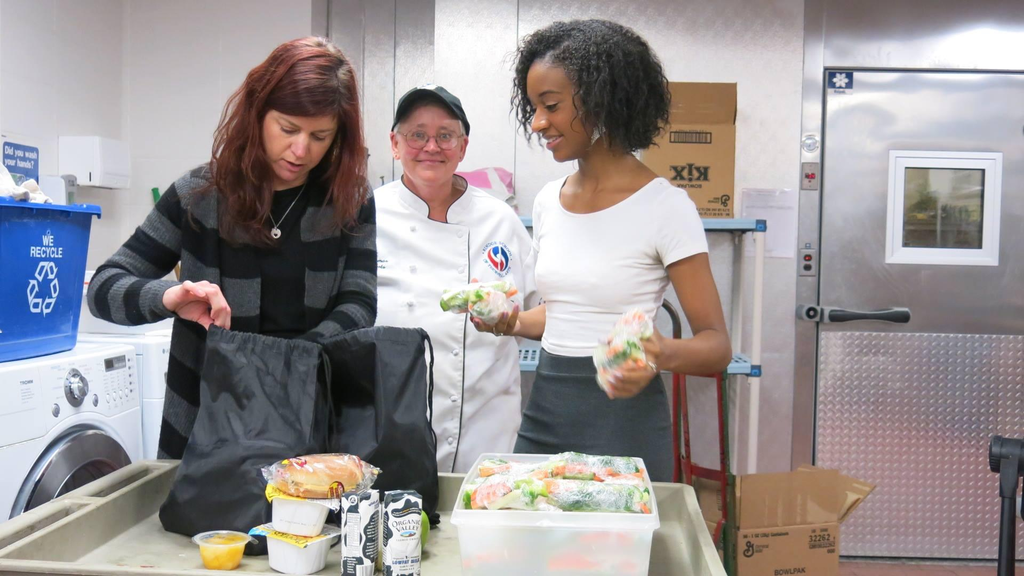CAMBRIDGE, Mass—Alanna Mallon spends her Friday mornings sorting food into neat piles and packaging it up. She’s part of the Cambridge Weekend Backpack Program (CWBP) — a volunteer-run food distribution program that provides food backpacks for food-insecure children to take home over weekends and school holidays.
Volunteers at each school package the food under the direction of a school captain. The captains work with a list prepared by a team of administrators and staff at each school that identifies students as high-risk. These students get a food backpack to take home at the end of the school day on Friday. In addition to school age children, food bags are provided to families that also have younger children at home. The intention is that every young child gets a food bag and all children are taken care of. “It’s really impossible to teach children in school who are hungry,” Mallon said.
Participating students include children from four years of age to 14, from kindergarten through middle school. Mallon elaborated that kindergarten and middle school students appreciate of the food. She remarked that this surplus food is helping to fill an important need and helping children to learn in school.
CWBP has also started a program at the Cambridge Rindge and Latin School (CRLS). Mallon conceded that the CRLS program needs more work to become effective. She said she is looking at making this program into a food pantry and circulating food to cover the weekends. “CRLS students are more difficult to satisfy. We will need to be more creative in helping this student group and may need the help of business and civic organizations,” Mallon said.
CWBP is 18 months old and is closing in on its second birthday. It has grown significantly in a year and half from one to 10 schools, from fifteen to 220 students, and now has the help of 100 volunteers. The high cost of food and the rise in the food insecurity rate from 42% to 48%, according to the Cambridge Public Health Department 2013 survey, have contributed to families struggling to put food on their tables. Again, this impacts children’s capacity to learn. “It’s really impossible to teach kids who are hungry,”’ Mallon said. “When you are hungry for lunch, all you can concentrate on is how hungry you are.”
Mallon pointed out that a National Public Radio (NPR) story focusing on backpack organizations sending students home with food over the weekend and school holidays to helped inspire her.
This story of young children not having enough food in her own children’s school pushed Mallon into action. She became determined to help create a program which would provide additional food to children and families facing food insecurity. It took Mallon two months to build partnerships with the city’s school administration, the Cambridge Health Alliance (CHA), as well as civic and municipal groups. By March 2013, she raised enough funds to launch a pilot program. In October of that year she rolled out the pilot at the North Cambridge Tobin Montessori School. She had fifteen students.
CWBP sends children home with a bag containing four weekend meals, including two breakfasts and two lunches. The bag contains breakfast foods such as instant cereal, oatmeal, muffins and bread. The bag also contains lunch provisions such as soup, pasta, sandwiches, pudding, crackers and cheese. Milk and fresh fruit are provided for both meals.
Mallon also pointed out that some of the program’s schools conduct food drives which go toward supplementing the food that they receive.
According to Mallon, civic and community support for CWBP has been very strong from the outset. The CHA’s Children’s Care Foundation provided 75 percent of the start-up funding. The remaining 25 percent came from parents and other donors at the Tobin school. The Central Square-based Margaret Fuller Neighborhood House is the now the program’s business sponsor, and it helps with funding and grants.
Mallon pointed out that, in addition to CHA, she has gotten funding from local businesses such as Draper Labs and the Whole Foods stores located in Cambridge. Whole Foods has sponsored two fundraising events at their three Cambridge stores in late 2013 and 2014. Food For Free, a local food security organization focused on fighting waste, has provided fresh fruit for the program. It has delivered two pieces of fresh fruit for each student, or over 400 pieces of fruit every school week. That’s 13,000 pieces of fruits each school year.
“CWBP is in 10 of the 17 public schools in Cambridge, including CRLS. We would like to expand in the future to all of the public schools within the city. We would like to help food-insecure children and families citywide,” Mallon said.

Leave a Reply
You must be logged in to post a comment.